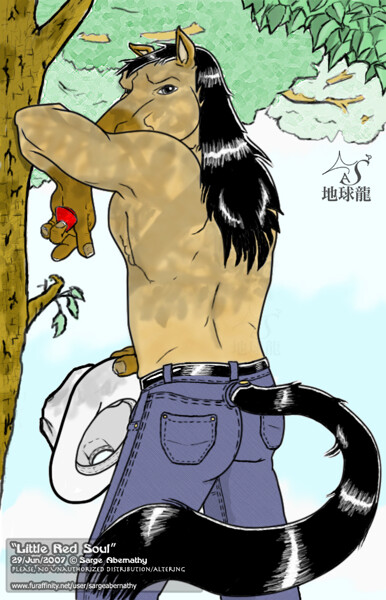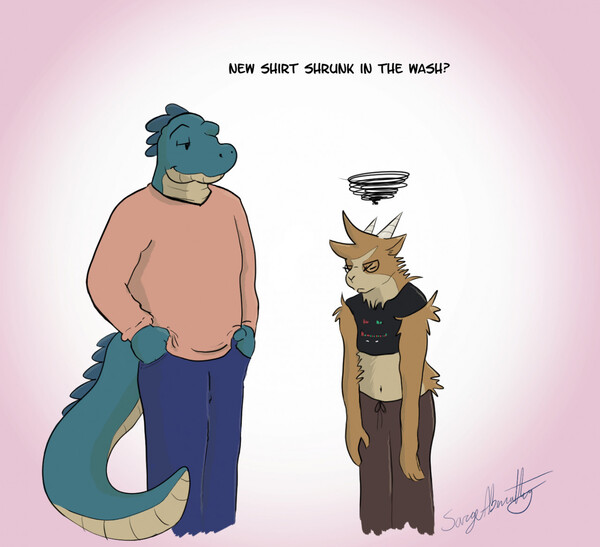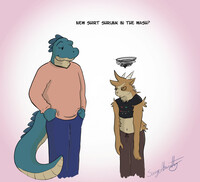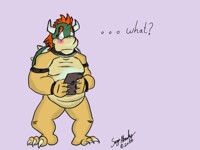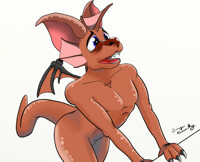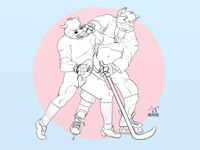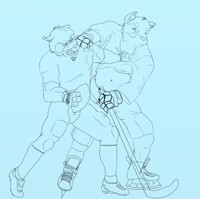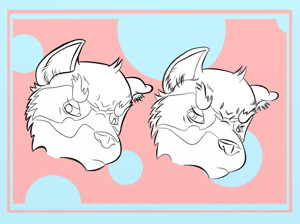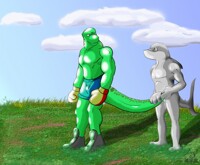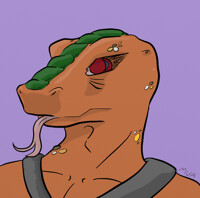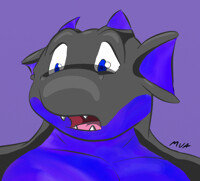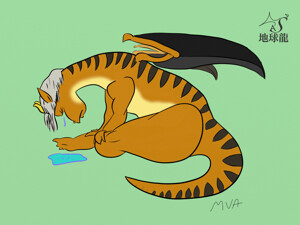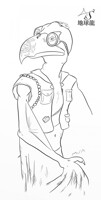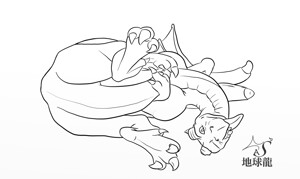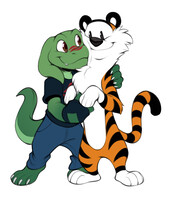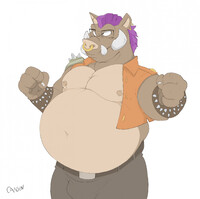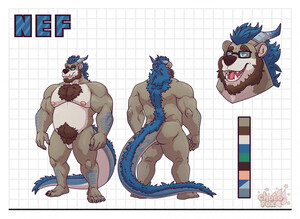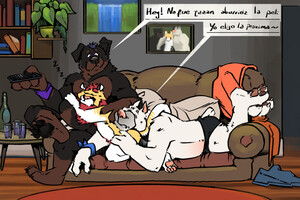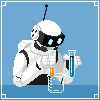Views: 8469
Submissions: 125
Favs: 886

Vermont Dragon | Registered: Jul 27, 2006 11:34
Love drawing but often have had rough time due to letting mental blocks and distractions get in the way. I've been sketching a lot more for the last couple months much to my enjoyment, but nothing to show off just yet. I enjoy comics and stories the most. Subject matter I like reading about is anything furry and anything with adventure and romance.
I'm a geek at heart and a true introvert, but I enjoy good conversation and fun.
I'm a geek at heart and a true introvert, but I enjoy good conversation and fun.
Featured Submission
Stats
Comments Earned: 983
Comments Made: 1660
Journals: 86
Comments Made: 1660
Journals: 86
Recent Journal
Doctor Who and the Silurians/Ambassadors of Death
7 years ago
Doctor Who and the Silurians
So I'm back on my quest to watch the Classic era of Doctor Who after getting a subscription to Britbox. Up next is 1970's Doctor Who and the Silurians.
This is the second story for Pertwee and the introduction of the Silurians. A race that is featured prominently in the revival. It is remarkable the similarities this story has in comparison the their reintroduction in 2010's The Hungry Blood/Cold Earth.
The story structure is relatively the same. Humans are on the brink of a new discovery digging deep into the earth. They reawaken a dormant species hibernated to escape annihilation. In both stories it's a battle between species for survival and the Doctor helplessly trying to get them to co-exist. On both sides are voices of dissent, xenophobia, and fear.
Where the 1970 original differs is no one on the Human side is willing to face fear and give peace a chance. The Doctor's companion Liz certainly sides with him, but her role is only to be there as an assistant. The story could've played without her, (and that's really a shame).
The original also suffers in not resolving the themes of the guest cast effectively. Dr. Quinn played the egocentric scientist looking to make a name for himself in science by stealing knowledge, but dies by the third episode. Major Baker has an interesting degradation of character from a clam demeanor to a mistrusting one that hates the Doctor and the Silurians, but he dies by the fifth episode. Dr. Lawrence was a savage character who would not face any truth but his own, and dies without any resolution. Dawson became a more assertive character once Quinn dies, and advocates the genocide of the Silurians, but even her voice disappears.
The cast was not properly used and in the end I felt nothing gained or lost from their demises. This has happened before in Doctor Who, but the show has shown the ability to use their cast effectively as well. The Seeds of Death and The Enemy of the World are prime examples. And in my opinion Hungry Blood/Cold Earth also does it better.
The story is remarkably different from what I'm use to. There are similarities to other base-under-siege stories, and certainly a lot of similarities to The Web of Fear: The Doctor gets some sort of HQ outside the TARDIS and the plot centers around a chess game of us vs. them.
Yet, it's got a new feel that isn't anything I'm use to. The First and Second doctor's eras were old, but they were similar enough to the revival series to be recognizable. I'm not sure how to feel about the new themes with the Third Doctor. I'll have to see more.
What this story has over Hungry Blood/Cold Earth is that it's not seeking to make a mark on pop culture. It's a serial. It's a story someone wrote for a serialized show. Matt Smith's story was about being sure to show off a new monster, and having Rory suddenly disappear from all of time. Scenes like that can get distracting when you're trying to analyze the sci-fi story over the soap opera story. Now that being said, Hungry Blood/Cold Earth did have a remarkable sci-fi story attached to it and used its characters more effectively. Yet, 1970's The Silurians felt more real because the frustrations of the Doctor could be felt. Jon Pertwee was angry. I never felt that with Matt Smith and his story.
What surprised me the most is the callousness of The Brigadier. His last action in the story is heartless, and the look of disappointment and anger in the Doctor's eyes in the last scene is masterful. Jon Pertwee's acting has won me over in just two serials and I can now defiantly see that he is the Doctor.
______________________________
The Ambassadors of Death
The Ambassadors of Death has some positives going for it. Unlike the last story, this one knew what to do with the cast. There was an investment into the side character's story.
General Carrington is a very intense character. His motives made the plot's climax rewarding. The Doctor understood why Carrington acted so insanely, and in the end did not show any anger. The Doctor gave a silent nod of sympathy and sadness.
Reegan is damn clever, which is a characteristic I'd love to see more of. Every time something got in his way he'd bounce back. His last scene was just him smirking at the entire situation. I loved it.
Ralph Cornish is another character that I appreciated, though others could certainly find him dry. There wasn't much to the personality, but enough to find him a voice that aligned perfectly with the Doctor and the Brig. He was an anchor in the mystery. Had he been cast as a villain or someone untrustworthy then the Cloak and Dagger feel of the first five episodes wouldn't have worked. He was betrayed by his own men, pushed into a corner by authority, and yet stood his moral ground. I thought it was fitting that the Doctor left him to conduct the exchange at the end ... as if he fully trusted him to communicate with the Ambassadors and get them home with the help of Liz.
Other characters came and went and left less of an impression, though certainly offered something to the plot. Taltalian and Lennox were both pawns in the larger scheme, but I felt that Taltalian's death made more sense. It introduced the savagery of Reegan, and offered more mystery to the plot. Lennox's death however felt stupid. I don't understand the purpose. The only thing it made me feel is frustration with the Brigadier and Lennox. If Lennox refused to speak to anyone but the Brig but offered up knowledge of the Astronauts, the least he could do was also state that Liz was safe. Regardless, The Brig acted stupidly in not immediately seeking out the information. The man offered information on the Astronauts who weren't publicly known yet. Get up off your ass and go speak to him, damn it!
The Brig's part in this story speaks volumes his depth of character. By the end of Silurians he shown himself to be cruel but only because it was for the greater good. The Doctor wanted to gain the trust of each Silurian one at a time, but that would've been a tiring and risky task with a species that proved to be extremely dangerous.
In this story, the Brig showed less concern for the immediate destruction of Earth and did what he could to stop Carrington's attack on the space ship. This story is a different scenario for the Brig. The Amabassadors posed an immediate threat that could wipe out the planet. Missiles, even if they did work, would only result in a fleet returning to destroy the Earth. The Silurians however were not the threat. The threat was the Doctor's fallacy in thinking he could spend decades waking up each one to a "peaceful" earth.
The Brig has become immensely interesting in how he plays off the Doctor. He frustrates me at times, but the Doctor has his faults and in the end needs the Brig to bring him back to reality.
Liz Shaw, for her part, had much more to do here. So I appreciated that. However, I'm crossing my fingers that she gets even more plot in her last story ...
This story is called Ambassadors of Death, and like many titles it offers a double meaning. The entire plot centers around Carrington's insanity in thinking these Ambassadors are here to destroy Earth. The Ambassadors themselves can kill with just a touch. However, the true Ambassadors of Death would be Carrington and Reegan. They left a trail of death in their paths.
The last scene in this story was very surprising. It felt anti-climatic, but on the other hand it was fitting. This wasn't a story about the monster. It was the story of an insane man. A man, after fighting for so long, gave up. And it was the Doctor's empathy that ended this man's story as he walked off set. It felt natural for the Doctor to walk off set in the opposite direction toward the audience, the camera pulled further back to encompass the entire set and cast. I enjoyed it, but I hadn't been expecting it. I expected someone to fight to the bitter end. Reegan gave up with a smug face. Carrington gave up defeated and shamed. The point is that violence isn't the end solution, and it wasn't for this story either. A very different result than the previous story.
It's interesting how often space suits are used in this franchise as a Monster. Particularly in the New Series where it is used effectively in Silence in the Library, Forest of the Dead, The Impossible Astronaut, Oxygen, etc. There's something intriguing about that. It suggests a fear of being trapped, bound in a suit as if strapped in a straight jacket. You can't look in easily and can never be truly sure what's inside. It's spooky.
So I'm back on my quest to watch the Classic era of Doctor Who after getting a subscription to Britbox. Up next is 1970's Doctor Who and the Silurians.
This is the second story for Pertwee and the introduction of the Silurians. A race that is featured prominently in the revival. It is remarkable the similarities this story has in comparison the their reintroduction in 2010's The Hungry Blood/Cold Earth.
The story structure is relatively the same. Humans are on the brink of a new discovery digging deep into the earth. They reawaken a dormant species hibernated to escape annihilation. In both stories it's a battle between species for survival and the Doctor helplessly trying to get them to co-exist. On both sides are voices of dissent, xenophobia, and fear.
Where the 1970 original differs is no one on the Human side is willing to face fear and give peace a chance. The Doctor's companion Liz certainly sides with him, but her role is only to be there as an assistant. The story could've played without her, (and that's really a shame).
The original also suffers in not resolving the themes of the guest cast effectively. Dr. Quinn played the egocentric scientist looking to make a name for himself in science by stealing knowledge, but dies by the third episode. Major Baker has an interesting degradation of character from a clam demeanor to a mistrusting one that hates the Doctor and the Silurians, but he dies by the fifth episode. Dr. Lawrence was a savage character who would not face any truth but his own, and dies without any resolution. Dawson became a more assertive character once Quinn dies, and advocates the genocide of the Silurians, but even her voice disappears.
The cast was not properly used and in the end I felt nothing gained or lost from their demises. This has happened before in Doctor Who, but the show has shown the ability to use their cast effectively as well. The Seeds of Death and The Enemy of the World are prime examples. And in my opinion Hungry Blood/Cold Earth also does it better.
The story is remarkably different from what I'm use to. There are similarities to other base-under-siege stories, and certainly a lot of similarities to The Web of Fear: The Doctor gets some sort of HQ outside the TARDIS and the plot centers around a chess game of us vs. them.
Yet, it's got a new feel that isn't anything I'm use to. The First and Second doctor's eras were old, but they were similar enough to the revival series to be recognizable. I'm not sure how to feel about the new themes with the Third Doctor. I'll have to see more.
What this story has over Hungry Blood/Cold Earth is that it's not seeking to make a mark on pop culture. It's a serial. It's a story someone wrote for a serialized show. Matt Smith's story was about being sure to show off a new monster, and having Rory suddenly disappear from all of time. Scenes like that can get distracting when you're trying to analyze the sci-fi story over the soap opera story. Now that being said, Hungry Blood/Cold Earth did have a remarkable sci-fi story attached to it and used its characters more effectively. Yet, 1970's The Silurians felt more real because the frustrations of the Doctor could be felt. Jon Pertwee was angry. I never felt that with Matt Smith and his story.
What surprised me the most is the callousness of The Brigadier. His last action in the story is heartless, and the look of disappointment and anger in the Doctor's eyes in the last scene is masterful. Jon Pertwee's acting has won me over in just two serials and I can now defiantly see that he is the Doctor.
______________________________
The Ambassadors of Death
The Ambassadors of Death has some positives going for it. Unlike the last story, this one knew what to do with the cast. There was an investment into the side character's story.
General Carrington is a very intense character. His motives made the plot's climax rewarding. The Doctor understood why Carrington acted so insanely, and in the end did not show any anger. The Doctor gave a silent nod of sympathy and sadness.
Reegan is damn clever, which is a characteristic I'd love to see more of. Every time something got in his way he'd bounce back. His last scene was just him smirking at the entire situation. I loved it.
Ralph Cornish is another character that I appreciated, though others could certainly find him dry. There wasn't much to the personality, but enough to find him a voice that aligned perfectly with the Doctor and the Brig. He was an anchor in the mystery. Had he been cast as a villain or someone untrustworthy then the Cloak and Dagger feel of the first five episodes wouldn't have worked. He was betrayed by his own men, pushed into a corner by authority, and yet stood his moral ground. I thought it was fitting that the Doctor left him to conduct the exchange at the end ... as if he fully trusted him to communicate with the Ambassadors and get them home with the help of Liz.
Other characters came and went and left less of an impression, though certainly offered something to the plot. Taltalian and Lennox were both pawns in the larger scheme, but I felt that Taltalian's death made more sense. It introduced the savagery of Reegan, and offered more mystery to the plot. Lennox's death however felt stupid. I don't understand the purpose. The only thing it made me feel is frustration with the Brigadier and Lennox. If Lennox refused to speak to anyone but the Brig but offered up knowledge of the Astronauts, the least he could do was also state that Liz was safe. Regardless, The Brig acted stupidly in not immediately seeking out the information. The man offered information on the Astronauts who weren't publicly known yet. Get up off your ass and go speak to him, damn it!
The Brig's part in this story speaks volumes his depth of character. By the end of Silurians he shown himself to be cruel but only because it was for the greater good. The Doctor wanted to gain the trust of each Silurian one at a time, but that would've been a tiring and risky task with a species that proved to be extremely dangerous.
In this story, the Brig showed less concern for the immediate destruction of Earth and did what he could to stop Carrington's attack on the space ship. This story is a different scenario for the Brig. The Amabassadors posed an immediate threat that could wipe out the planet. Missiles, even if they did work, would only result in a fleet returning to destroy the Earth. The Silurians however were not the threat. The threat was the Doctor's fallacy in thinking he could spend decades waking up each one to a "peaceful" earth.
The Brig has become immensely interesting in how he plays off the Doctor. He frustrates me at times, but the Doctor has his faults and in the end needs the Brig to bring him back to reality.
Liz Shaw, for her part, had much more to do here. So I appreciated that. However, I'm crossing my fingers that she gets even more plot in her last story ...
This story is called Ambassadors of Death, and like many titles it offers a double meaning. The entire plot centers around Carrington's insanity in thinking these Ambassadors are here to destroy Earth. The Ambassadors themselves can kill with just a touch. However, the true Ambassadors of Death would be Carrington and Reegan. They left a trail of death in their paths.
The last scene in this story was very surprising. It felt anti-climatic, but on the other hand it was fitting. This wasn't a story about the monster. It was the story of an insane man. A man, after fighting for so long, gave up. And it was the Doctor's empathy that ended this man's story as he walked off set. It felt natural for the Doctor to walk off set in the opposite direction toward the audience, the camera pulled further back to encompass the entire set and cast. I enjoyed it, but I hadn't been expecting it. I expected someone to fight to the bitter end. Reegan gave up with a smug face. Carrington gave up defeated and shamed. The point is that violence isn't the end solution, and it wasn't for this story either. A very different result than the previous story.
It's interesting how often space suits are used in this franchise as a Monster. Particularly in the New Series where it is used effectively in Silence in the Library, Forest of the Dead, The Impossible Astronaut, Oxygen, etc. There's something intriguing about that. It suggests a fear of being trapped, bound in a suit as if strapped in a straight jacket. You can't look in easily and can never be truly sure what's inside. It's spooky.
User Profile
Accepting Trades
No Accepting Commissions
No Character Species
Bronze Dragon
Favorite Music
Whatever
Favorite TV Shows & Movies
Contact, Parasite, Rashomon
Favorite Games
Minecraft, Legends Arceus
Favorite Gaming Platforms
PC, Nintendo
Favorite Animals
Dragons, Orcs, Wolves, Bulls, Horses, etc.
Favorite Foods & Drinks
Anything. I'm a huge foodie.
Favorite Artists
 Negger,
Negger,  Beralin,
Beralin,  ChocolateAndMilk,
ChocolateAndMilk,  darkgem,
darkgem,  Tojo-The-Thief,
Tojo-The-Thief,  fydbac,
fydbac,  grisser,
grisser,  narse,
narse, 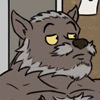 nanoff, :...
nanoff, :... 
 FA+
FA+
